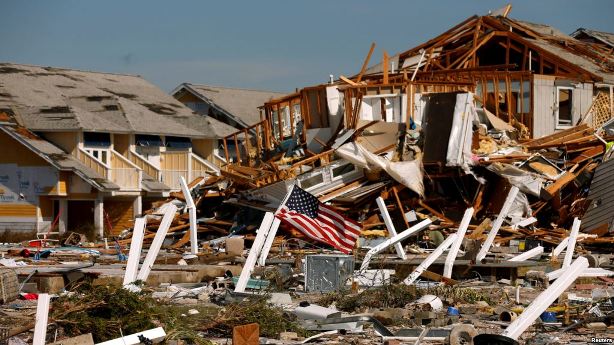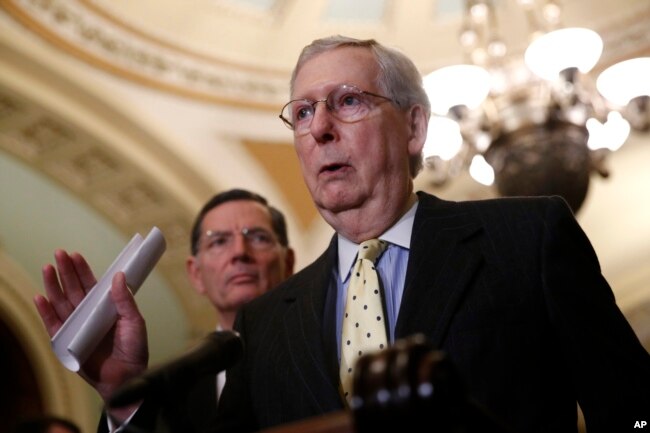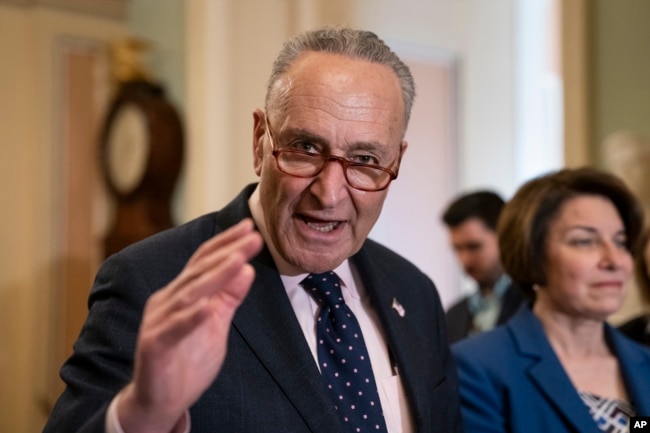
Infighting Stalls Disaster Aid for Puerto Rico, Southeast
VOA NEW – Associated Press
Six months after hurricanes devastated the Southeast, infighting among Washington’s tribes has shelved a widely backed disaster aid package that’s desperately being sought by President Donald Trump’s allies in Florida and Georgia.
Trump’s opposition to aid to Puerto Rico — slammed by back-to-back hurricanes in 2017 — has sparked a standoff with Democrats demanding more aid for the island U.S. territory. Trump is feuding with the island’s Democratic officials and railed against aid to Puerto Rico at a closed-door lunch with Senate Republicans last month.
Senate Republicans have stuck with the president so far, refusing to add more funding to help Puerto Rico rebuild its water systems or help its impoverished government with more generous disaster aid terms. Democrats in turn filibustered a $14 billion aid package over the issue last week, and the measure has languished since.

«Typically, when these kinds of things happen we figure out how to help as much as possible and do it on an overwhelming bipartisan basis and that’s what needs to be done now,» Senate Majority Leader Mitch McConnell, R-Ky., told reporters Thursday. «I think we’ll get there but it’s been a little too political in my opinion.»
Growing frustration
Now, both House and Senate are heading off for a two-week Easter recess, leaving struggling cotton farmers in the South in limbo and failing to ease food stamp cuts in Puerto Rico.
«It’s an absolute travesty that this chamber is recessing without a compromise on much-needed funding for disaster relief,» said Senate Minority Leader Chuck Schumer, D-N.Y. «From the start, Democrats have supported an all-of-the-above approach, help every part of America that’s struggling from natural disasters. We need to help everyone hurt last year, everyone hurt this year, everyone hurt in Puerto Rico, everyone hurt in the middle West, everyone hurt in Florida.»

The cross-party finger pointing has been predictable, but Republicans are also upset with the White House.
«Never before have we seen American communities that were wrecked with catastrophes neglected like this,» said Rep. Austin Scott, R-Ga., usually a Trump loyalist, in a floor speech this week. «To this day, OMB has not even submitted a request for disaster assistance, calls to White House staff have gone unheeded, and but for one tweet on April 1, it seems the president has moved on.»
Frustration is also bubbling in the Senate, where Trump allies such as David Perdue of Georgia and Rick Scott of Florida — a state that’s crucial to Trump’s re-election — are pressuring the president to deal. Scott visited with Trump on Thursday at the White House, along with Senate Appropriations Committee Chairman Richard Shelby, R-Ala.
«We’re going to discuss where we are and where we think we might be able to go,» Shelby said, telling reporters he was hoping to be able to make Democrats another offer afterward.
Partisan voting
Disaster aid bills have traditionally been nonpartisan, but hard feelings still linger from the 2012-2013 Superstorm Sandy experience, in which most Republicans voted against a huge aid package that went chiefly to Democratic New York and New Jersey. At the time, Schumer was especially upset.
Schumer led last week’s move to block the Senate measure but Democrats haven’t faced much political heat for the maneuver, and Schumer appears confident that Republicans will have to yield and give more aid to Puerto Rico.
The House passed a $14 billion measure in January but the measure got tangled up during the partial government shutdown. Earlier this week, House Appropriations Committee Chairwoman Nita Lowey, D-N.Y., unveiled a new bill with $3 billion more to respond to flooding in Midwestern states such as Iowa and Nebraska.
Trump has been slow to release already appropriated funding for Puerto Rico and critics say he has shown little urgency in helping the island. Trump attacked the island’s government at a recent meeting with Senate Republicans, telling them that Puerto Rico has gotten too much disaster help compared with states such as Texas.

